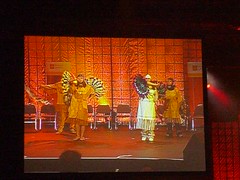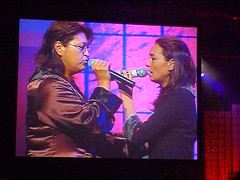Sunday 10 Aug, 9.30am. Quebec City Convention Center.
Huge venue.
I counted 4,096 seats.

The ceremony started with an ethnic dance by Canada's aboriginal people (or First Nation people). That was interesting. Though I felt it seemed repetitive (it was performed several times during the opening ceremony, and also during that evening's cultural performance).

This was an interesting performance!

I overheard someone say that it was a traditional song/ lullaby (unfortunately, no English explanation so I'm guessing here). What's interesting was their "singing", if it can be called that, was a mix of something guttural, melodic and rhythmic. Nice.
(Update: someone took a video and posted to YouTube. Web 2.0 comes to IFLA whether they like it or not, heh)
The Governor-General of Canada (equivalent to the President, I think) spoke. She was a very distinguished looking lady and sounded elegant as she delivered her speech (in French).

More speeches (this was Dr. Claudia Lux, President of IFLA). Nice of her to deliver her speech in in French, German, and English.



This is my fourth IFLA conference.
Overall impression of this one -- the performance was average.
Maybe it's because I don't speak or understand French. The performance included a narration in French. Then there was a poetry reading also in French.
I'm fine with that.
When in a different country, one should try to immerse in their culture.
But wished there were English subtitles or translations for the performances. I'm not sure how many other delegates spoke French.
In fairness, translation booths (manned by translators) and the receiver headsets were available.
French is one of the official language of IFLA. As per IFLA's practice, translators for the official languages were available for the opening ceremony.
But I didn't borrow a headset (queue was too long).
We all have an international audience
I thought for international audiences, the performance should involved more music and dances -- things that don't require language skills as a prerequisite to appreciate.
Which brings to mind: this is something libraries must consider as we upload content to YouTube. It's something I've mentioned before.
On the Internet, your audience is International.
You might as well market your library globally
Of course libraries should consider their primary audience first. If a French library puts up a video for its users, obviously they'd use French.
But it would be an excellent marketing tool if you provide English subtitles, or in the title or blurb, for a video in YouTube.
At least an English translation please
OK, I'm biased towards English. It's a first language in Singapore.
Also from my brief search on the Internet, English comes up tops.
While there's no definitive answer which is the most widely spoken language (see this, this, this and this), English is definitely in the top four or five.
Unless you want to try learning Mandarin.
I found English much easier since it's a phonetic-based language rather than a ideogram-based language like Mandarin.
But I digress...
Would I view the performance more favourably if I had English translation?
Can't tell.
Unless IFLA makes a video of its conference opening ceremonies, provide English subtitles or captions. Then I can give a comparison.
Come to think of it, IFLA ought to upload the opening ceremonies on YouTube.
It'll be excellent marketing material for IFLA.
With English subtitles and captions. Heh.
[Next: Part 6]

The Governor General is not really like a President. Canada has a Prime Minister, which is more "like" a President, and the GG is the Queen's representative in Canada (a dominion of England). The GG is thus above all political parties.
ReplyDeleteHi Anonymous, I guess it depends on which "president" we're referring to. You're right if it's the US presidential model, where the president of the USA is the political leader of the country.
ReplyDeleteI was referring more to the Singapore model (which is based on the UK model). The political head of the country is the Prime Minister. We also have a President, who has ceremonial roles and oversight responsibilities over financial reserves and key public offices appointments.